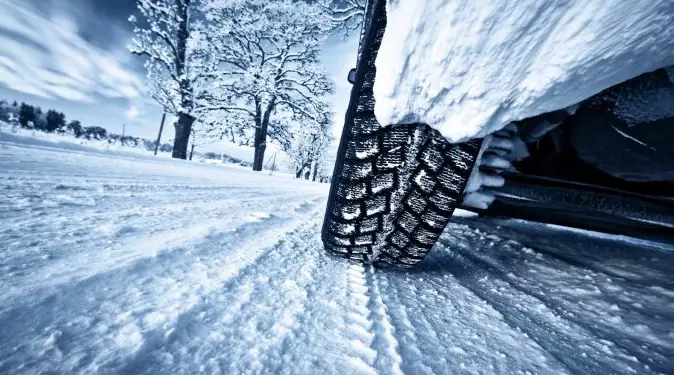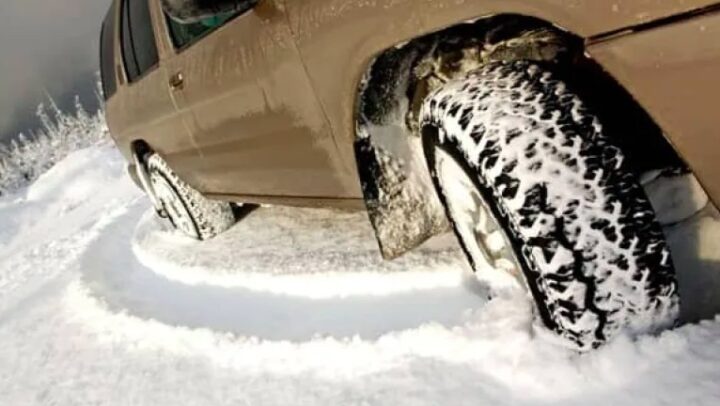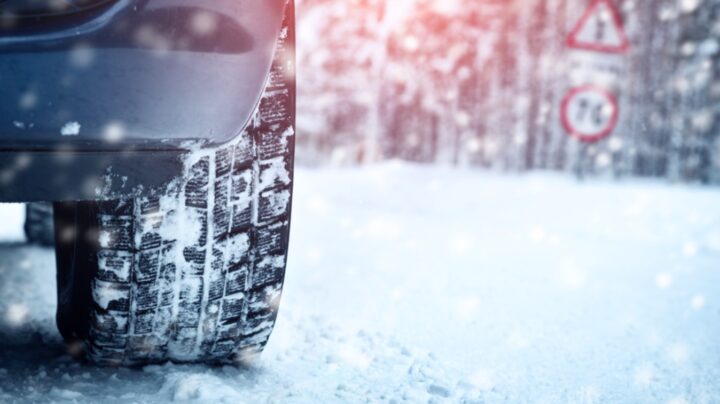This winter, you’ve noticed that the sound coming from your tires has been louder than it was last year. That’s because there is more snow on the ground and less traction as a result. You may have also noticed that your vehicle feels like it’s moving slower in these conditions too.
It turns out that better tread depth can help with this problem by giving your tire more bite into the slippery surface of ice or snow-covered roads to push through easier! Some drivers find themselves switching over to winter tires which are specifically designed for tough driving conditions like these.
If you have recently installed winter tires and noticed that they are super loud, worry not, as that’s (most likely) normal. In this article, we will explain why certain tires, namely winter ones, are noisier than usual.
Table of Contents
Why Are My Winter Tires So Loud?
Winter tires or snow tires tend to be louder than all-season or summer tires. This is the result of a lot of things. Cars are made up of a lot of moving parts, and compromises are made so that all these parts work perfectly in sync.
When it comes to tires, manufacturers make decisions based on handling, grip, ride quality, noise, and more. So, in this case, if they are making a tire for winter use, they’d normally focus on delivering a good grip above everything else.
Higher than usual road noise is the result of three primary design choices within a tire. One is the treads, one is the spacing between them, and the other is the rubber’s composition.
These three elements affect the amount of noise in different ways:
Tread Spacing
Manufacturers design treads with wide spaces between them to give the tires a good amount of grip. It also creates a path for snow to be displaced as you’re moving. But if the roads are clear, though, you will hear the loud sound of compressed air passing through the tread groove. This is very noticeable at highways speeds.
Winter tires tend to be noisier than summer tires, and only the most premium ones come with uniquely shaped grooves that prevent air compression, thus significantly reducing the amount of noise.
Tread Blocks
Winter tires tend to have a huskier look to them, mainly due to the way their treads are designed. There are numerous tread designs for winter tires, including asymmetrical ones, arrowhead ones, V-shaped ones, and more. Each of these designs helps to give you a good amount of traction by pushing away snow. However, this increased traction comes at the cost of the tires being louder.
Rubber Composition
Winter tires tend to have a softer composition in comparison to summer ones, an intentional design choice that allows them to stay pliable and sticky at extremely low temperatures. Winter tires simultaneously bend and grip snow similar to the soles of a winter boot.
They also contain silica, a material similar to sand, which gives the rubber a biting edge on snow.
So, the composition of a winter tire usually offers excellent driving conditions during cold weather but at the cost of road noise, as usual.
Still, you have to realize that this noise is merely a trade-off for all the pros that you’d be getting for using winter tires during cold times.
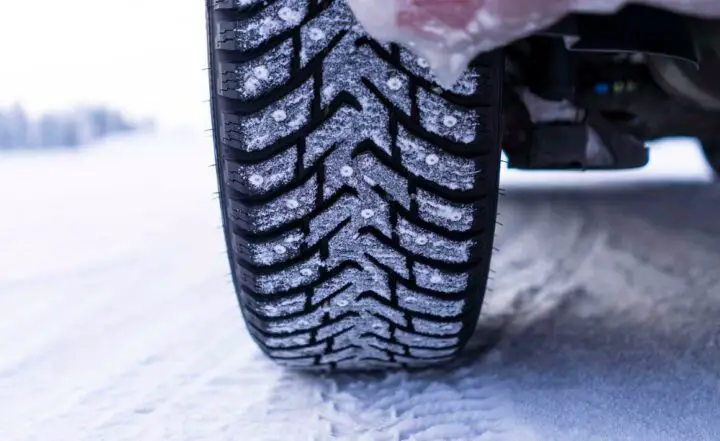
What Makes Car Tires Sound Louder in General?
There are many reasons as to why a car’s tires might be a bit too loud. Some are normal, others, not so much.
Normal Reasons
Here are some normal reasons that can make your car tires sound louder than usual:
Tire-Related Reasons
Tire Type
Each and every tire type out there makes noise. Winter tires, mainly studded ones, as well as off-road car tires, sound particularly loud, mainly due to their unique tread patterns. Additionally, run-flat tires can be noisy, too, due to their stiffer than usual sidewalls.
Performance tires, on the other hand, aren’t as noisy. But the title of the quietest tires goes to touring tires and any tire with below-average rolling resistance, obviously. If you have these tires and they are noisy in normal conditions, then there is a serious problem with your tires or car.
Tire Size
Tires that are bigger or smaller than average usually sound louder. For instance, a 265/ tire has a bigger contact area than a 235/ one, and as a result, it will generate significantly more noise.
Smaller tires, on the other hand, like the 40-series, for example, don’t have enough sidewall area to absorb the noise, so they end up sounding louder than usual.
Tire Tread
A more symmetrical or aggressive tire tread leads to noise. The reason behind this is the compression of the air between the tire and the surface it’s running on.
The larger the space between the blocks, the more air will get trapped, making the tires louder.
Tire makers who aim to create quieter tires will put various tread block patterns close to each other. Each block pattern will produce a different noise when air comes blasting out of it. The idea is to balance all these different noises to create one single, neutral, white noise. This is known as pitch sequencing and is very efficient at reducing tire noise.
Road Conditions
Coarse surfaces can make your tires sound louder than usual. Even a road with a recently done finish can cause hollow noise due to it being sticky or having pores in it.
Sometimes, roads have a layer of concrete or asphalt temporarily removed for repair, which can lead to a rubbing sound when driven on.
In other words, the best surface to test your tires on is a recently renovated asphalt or concrete road.
Driving Conditions
Tires can also be noisier because of the following driving habits and/or conditions:
Constantly driving at high speeds.
- High-speed cornering
- Carrying heavy loads
- Rapid acceleration
- Hard-braking
Because of these factors, the air in the tire grooves can become more compressed, making them louder than usual. Even more, when driving at high speeds, for instance, there is more air circulation on the treads, which means more tire noise.
Additionally, tires tend to squeal when you rapidly accelerate or pull off maneuvers at high speeds.
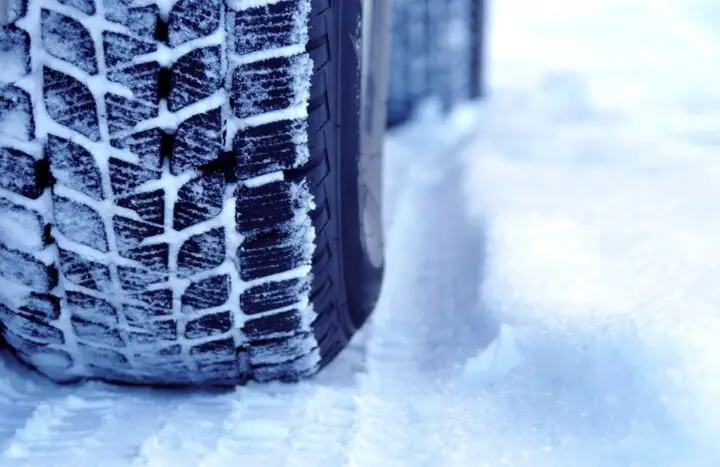
Abnormal Reasons
Moving on to the abnormal reasons that can make your tires noisy:
Uneven Treadwear
Uneven tread wear might lead to excessive vibration and noise, and every noise pattern can indicate a different issue. Some of the most common patterns are:
Under-inflation
A tire is underinflated if its inside and outside edges wear significantly more than the central part. When you drive your car around, the tire flattens a lot, which adds a lot of extra pressure on the outer edges. Consequently, the air going in between the tread and tire will sound different and louder.
The usual noise in case of under-inflation is squealing.
Over-inflation
If the center part of the tire wears faster than the edges, it’s probably over-inflated. This means that the central blocks of the tire take a lot of pressure. To avoid such a problem from occurring, check your tires’ inflation rates every one thousand miles of mileage or so.
Camber Wear
Camber or one-shoulder wear refers to the phenomenon where one of the shoulders of a tire wears more than the rest. This is usually an indication of wheel misalignment, usually located in the camber angle. Such a misalignment can also be caused by a damaged ball joint or a problem in the suspension.
Feathering
A tire is feathering when one edge of the rib rounds and the other sharpens. A wrong toe-in setting is usually the cause of this problem. It’s one of the many parameters of wheel alignment. Worn-out front suspension or bushings can cause this issue too.
Cupping
Tire cupping happens when areas across the tread look scooped. This can be the result of tire imbalance, a worn-out or bent suspension, and more.
Keep in mind that cupping is the most dangerous irregular sound because it causes the tire to vibrate heavily.
If you notice any of these patterns, make sure to determine the cause of the issue and fix it as soon as possible, then test the tires again. If the noise is still there, you might want to consider changing the tires.
Improper Maintenance
If your car tires sound loud, they may require some maintenance. The same goes for the wheels, suspension, and more. There are three main procedures that you need to include in your maintenance routine, and they are:
- Wheel alignment
- Tire balancing
- Tire rotation
If you don’t regularly do these procedures on a regular basis, your tires will wear in an uneven manner, causing loud noises as a result.
Wheel Alignment
When wheels are misaligned, they make car tires wear unevenly and sound louder. This is due to the fact that they aren’t perpendicular to the ground. Additionally, the car might tilt to one side, which can make controlling it more difficult than usual. Even suspension will start to prematurely wear if the wheels are misaligned.
Wheel alignment is a combination of three angles to which the suspension is fitted:
- Camber: is the angle responsible for the wheels being perpendicular to the road.
- Caster: is responsible for the relation of the steering axis to the road.
- Toe: is responsible for the wheels being parallel to each other.
Most vehicle manufacturers fail to mention this very important procedure in their guides, so there aren’t any time or mileage-related recommendations for how often you should realign your wheels. However, the general rule of thumb is to do it annually. It will cost you around $60 to $100 at a tire shop.
Tire Balancing
Imbalanced vehicle tires vibrate more and sound loud, especially at speeds higher than 40 mph. Additionally, they will unevenly wear, which might lead to damage to the suspension parts.
A weight distribution needs to be done around the tires so that they become even. This procedure needs to be done every 3,000 to 6,000 miles. This is due to the fact that tire wear is somewhat inevitable, and it leads to a state of unbalance in the weight distribution.
You can balance your tires at a mechanic. They will locate any spot where the rubber is thicker and work from there. It will cost your anywhere from $20 to $80 depending on the mechanic, the state of the tires, and more.
Tire Rotation
Tires that aren’t rotated frequently don’t last well and sound louder. Tire rotation is basically the movement of tires on their rims to various spots on a vehicle. It helps to even weight distribution between them.
Front tires obviously have more weight on them because of the engine and other vital parts that are usually placed upfront. Additionally, in the US, the front-left tire rotates because of the right-hand side traffic, so they tend to wear faster than the rest.
We recommend that you rotate all of the tires of your vehicle every 5,000 miles or so. It can be done for anywhere from $25 to $120 at a dealership or tire shop. Of course, you can rotate the wires all by yourself, but you need to carefully check the wear of each individual tire as well as their alignment.
There are numerous rotation patterns, all of which depend on how worn off the tires are, their size, direction, and more. Some drivers include a spare tire in the chosen pattern. This is a great idea because it can extend a tire’s lifespan to around 40,000 miles or so.
Damage to Other Parts Of Your Vehicle
There are numerous other parts within your vehicle that might cause your tires to sound loud.
Certain parts wear out or become loose over time, causing different, loud sounds, some of which you may perceive as tire sounds. They can also lead to vibration, which makes tires more dangerous to operate and generally noisier
Here are the parts that should be considered when it comes to noisy cars:
Wheel Bearings
If you hear a roaring-like sound when you change lanes, then you might want to consider replacing your wheel bearings. This sound will get louder the higher the speed is. It is highly recommended to replace them as soon as you notice this sound because this problem can increase the chances of you losing control of the car, god forbid.
CV Joints
Constant Velocity joints might wear out over time and usually cause a clicking noise. This is because the axle loses the flexibility it needs to function properly. This can lead your car tires to sound loud because they become more prone to shock due to the wobbling.
Struts
If struts are damaged, they will fail to function properly, rendering the suspension fully inoperable. This leads to noticeably more shock and vibration, and it puts more pressure on the tires, making them noisier than ever.
Struts play a key role in absorbing any shock from uneven surfaces.
Hubcap Lug Nuts
If the hubcap lug nuts become loose, the hubcap will violently shake on every turn you take or whenever you increase speed, leading to a rattling sound.
Drive Belt
A loose drive belt produces noise, which people often confuse with wheel noise. Drive belts connect the crankshaft to the alternator, air condition system, and power steering. The former provides them with power.
What Can I Do to Reduce the Sound?
Here are a few things that you can do to decrease or completely eliminate the chances of your car developing loud tires:
Choose Your Tires Wisely
There are a lot of factors that you need to consider when getting new tires. If one of your priorities is having them be as quiet as possible, then you should probably opt for touring tires. These tires have unique tread patterns that make them produce little to no unnecessary sounds when driving.
Maintain Your Tires
On average, your vehicle’s tires will turn around 8 million times every 10,000 miles. So, balancing or rotating them once in a while isn’t enough. If they are noisy, then that might mean that you’re not maintaining them. Our recommendation for this is to stick to a specific routine.
Get New Tires When Needed
Tires last anywhere between 5 to 10 years. Their life span depends on their type and how well you take care of them. If they surpass their average lifespan, replace them. One way to tell when it’s time to do so is through cracks on the rubber.
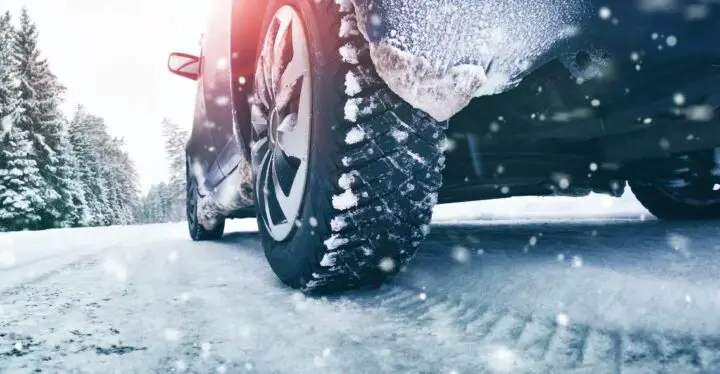
Main Takeaways – Why Are My Winter Tires So Loud?
If you’re feeling a little confused about why your winter tires are so loud, don’t worry. We’ve got all the answers for you! It’s likely that they have become worn down over time and now need to be replaced.
Another possible reason is that there might not be enough air pressure in them. Check out our blog post on how to fix this problem and get back to enjoying those snowy roads with peace of mind!
Winter tires work better in the snow by providing more traction on uneven surfaces or icy patches. They also have softer treads than summer tires which means they don’t wear down as quickly when driving through slushy conditions in the cold weather.
You’ll save money with less expensive replacements if you invest in good-quality winter tires for your vehicle!

